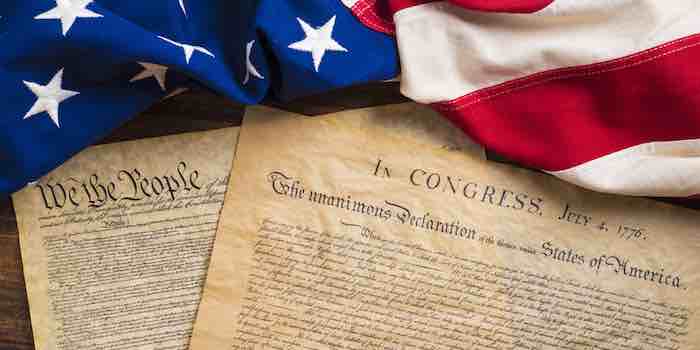By Terry Oxley ——Bio and Archives--April 16, 2023
American Politics, News | CFP Comments | Reader Friendly | Subscribe | Email Us

I penned this piece to bring order to my thoughts – worrisome thoughts. Progressives seem confident that resistance to radical social change can be dismissed as simple anchor dragging by reactionaries meaning those on the political Right. A serious charge but is it true?
There is a predictable stress point between impulses to conserve the traditional and familiar and to change the status quo. Both are survival instincts, failure to embrace change stifles creativity and adaptability. Conversely, jettisoning what is foundational for the theoretical can be destabilizing and destructive. Balancing the virtues of both would seem the logical path, however, contemporary events show our cherished republic is at an impasse and foundational liberties are under siege.
Is current political and social divisiveness new or just a continuation of an old and fundamental struggle? Perhaps a look back to our nation’s founding will offer a clue. In the 18th century the American idea was definitively forged. A time when a principle referred to as Natural Law would yield radical concepts of equality and individual rights. Rights that would eventually lead to the end of involuntary servitude and give rise to individual freedom of speech, religion and other treasured liberties enumerated in the Constitution’s Bill of Rights.
What is Natural Law? The founders were greatly influenced by a revolutionary concept that basic human rights were not something to be dispensed by kings or other autocratic rulers. Rather, they believed individual human rights were providential and cemented in Natural Law which could be understood through application of logic and science. Among these rights, cited in the Declaration of Independence, were life, liberty and the pursuit of happiness. These rights were believed inalienable and could never be superseded by the lesser laws of men. Elected bodies could fashion legislative or “positive law” to facilitate civil order and administration, but such rulings were forever subservient to individual sovereign rights.
It was upon these revolutionary principles that the Constitution was crafted with heavy emphasis on individual liberty, the rule of law, and government with specific and limited powers. It followed that responsible individuals collaborating with fellow citizens in their respective communities could best manage their own affairs. Prior to the American Revolution with its foundation of Natural Law, the notion of government by the consent of free men and women was unprecedented.
Most leaders of the American Revolution were believers of the new and radical concepts of individual liberty and inalienable rights, but not all. Reactionary doubters of that time expressed varying degrees of opposition and some even wanted to make George Washington the first American king.
The doubters persisted and over a century later President Woodrow Wilson would openly express uncertainty about the founding principle of limited government. He believed the Constitution was speaking to the conditions of its time and did not predict the needs of a modern, complex and growing world power. Intellectuals of his time were influenced by philosophers like Friedrich Nietzsche who argued that “there are no facts just interpretations.” In the first half of the 20th century other members of the doubting class were inspired by Karl Marx and the Russian Revolution with its alluring promises of a classless society and universal equality.
Under constant siege, today’s revolutionary believers represent a remarkable diversity of ethnic and cultural origins. They remain faithful to the American idea and stand vigilant over their treasured legacy. Heirs of the revolutionary doubters, however, continue a relentless search for foundational weaknesses. Many claim the mantle of modernity and positive change. Some challenge the providential source of individual rights and believe that nothing is immutable. Others still believe that the basis of traditional beliefs and guiding principles are nothing but social contrivances ripe for change.
While modern day doubters no longer promote the primacy of kings, they continue to believe that an ever growing and powerful government is necessary to implement their ideals. Individuality, rule of law, free enterprise, religious faith, and diversity of thought and speech are increasingly challenged as outmoded, unscientific or even barriers to human progress.
If today’s divisiveness is a continuation of a centuries old struggle between revolutionary believers and doubters, will believers remain worthy of a democratic republic based on individual freedoms and limited government? Or will the doubters finally breach the founding principles and storm the last great bastion of freedom?
A founding believer, Benjamin Franklin, following the Constitution Convention said:
“I agree to this Constitution…and I believe, further, that this is likely to be well administered for a course of years, and can only end in despotism, as other forms have done before it, when the people shall become so corrupted as to need despotic government, being incapable of any other.”
Franklin’s admonition makes it clear that the greatest threat to our Constitution and the American idea is corruption. In a democratic republic, the threat of corruption is not that of kings, but of ‘we the people’ – people who no longer believe.
View Comments
Terry is a former utility executive, retired military officer and community service volunteer residing in Tumwater, WA. He has served as Board Director for the United Services Organization (USO), Washington Business Week Foundation, Washington Youth Academy and the Bellevue Schools Foundation. Terry has also served as a contributing writer for The Olympian, a newspaper headquartered in Olympia, WA.